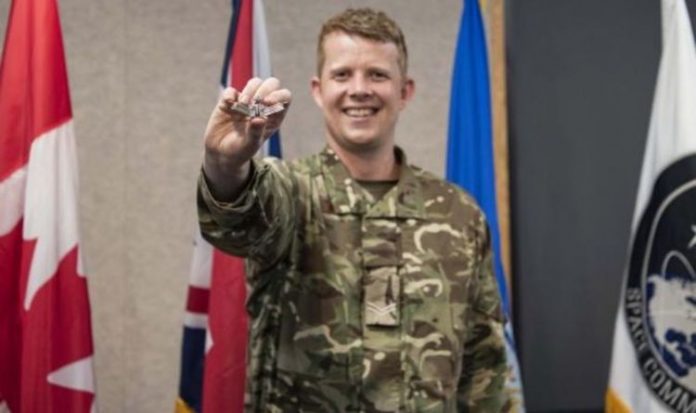Not bad for a schoolboy who struggled with his GCSEs and admitted “my younger brother had all the brains”.
RAF corporal Mitchell Astbury’s job is to detect, identify and track artificial objects in space so satellites and the International Space Station can be protected from collision and hostile action.
Attached to the 18th Space Control Squadron at Vandenburg Air Force Base, in California, he is the orbital analyser for Space Command. Or, as commander LT Col Justin Sorice puts it, his role amounts to “protecting humanity”.
Mitchell’s fascination with space began when he was eight years old.
After spotting his first satellite blinking in the evening sky a lifelong fascination with the stars began.
In his first public interview, the 31-year-old former Loughborough schoolboy said: “It’s such a privilege to be here. When I was eight I saw a flash in the sky. I knew it wasn’t an aeroplane so I asked a teacher. She opened my mind to things like satellites and objects in space.
“I wasn’t bright at school – my younger brother had all the brains. It took a lot of work for me to achieve my results at GCSE and get to where I am.
“I’d get distracted a lot when I was supposed to be studying. I’d try to look beyond the stars in the sky.
“But I never dreamed I’d be working alongside Nasa one day.”
The stakes are high for Mitchell. When he spotted his first satellite 23 years ago there were just 83 circling the Earth. Today, there are 2,666.
Broadband internet, mobile phones, weather prediction, GPS, TV stations and missile warning systems all depend on them.
One constant danger is space junk. There are 170 million pieces of debris in orbit according to the European Space Agency. At the speeds objects travel in orbit, even relatively small objects can cause quite catastrophic damage.
The International Space Station, partially operated by Nasa and central to plans for civilian space travel, has had to be moved 25 times since 1999 to avoid collisions. The latest incident was just four days ago.
Then there is the threat from China, Russia, Iran and North Korea, who all continue to develop anti-satellite capabilities.
China was the first country to use them to destroy a redundant weather satellite in 2007. Both Russia and China have also manoeuvred satellites very close to those of the West, raising fears they could be used to jam or drag them out of orbit.
Russia’s decision to launch such a satellite last month – detected by US Space Command – prompted Britain to launch a draft UN resolution which was aimed at controlling weapons or technology that could damage space systems.
Gen John W Raymond, who heads US Space Command, said the launch was “further evidence of Russia’s continuing efforts to develop and test space-based systems, and consistent with the Kremlin’s published military doctrine to employ weapons that hold US and allied space assets at risk”.
Mitchell – whose uncle Chris Shaw was with the Red Arrows – joined the RAF at 18, intent on serving at RAF Fylingdales, home to the ballistic missile early warning system.
Last year the RAF became the first international partner in US Space Command’s Operation Olympic Defender, a coalition whose mission it is to deter hostile actions in space.
Mitchell seized his chance and was selected after excelling in training.
Now, surrounded by 15 other operatives, he spends eight-hour shifts examining sound wave patterns on a monitor. His squadron monitors 3,200 active satellites for close approaches with 24,000 pieces of space debris.
On an average day it issues 15 “high-interest warnings” for active near-Earth satellites and 10 for active deep-space satellites. The information is shared with at least 25 different governments, whose responsibility is to move their satellites – and quickly.
He said: “My job is a bit like air traffic control. I have to make sure each object is doing what it’s supposed to be doing.
“I also process the re-entry of satellites because what goes up must come down.”
And calculations have to be exact. A one-minute error in predicting a re-entry time for an object in low Earth orbit changes the location of potential falling debris by nearly 300 miles.
He added: “If there was a hostile act, I’d see the flash on my system. If a country tries to launch an unscheduled satellite we’d see that too.
“We are given a weekly schedule of launches. Whatever’s launched into space, we know about it. Nothing catches us out.”
While Mitchell spends his days safeguarding space, life closer to home is exciting, too. “I came here with my wife, Zoe, about a year ago, and we’ll be here for another two years,” he said.
“Just a couple weeks after landing in California she fell pregnant and on New Year’s Day my daughter Esmae was born. To be here, and to become a new dad too, is amazing.”







